Table of Contents
- Weight loss apps can be a structured and supportive way for people to learn how to make positive changes to their nutrition and exercise habits, but they aren’t for everyone.
- We found that Noom does a great job promoting accountability, offering guidance and education, and encouraging healthy habits. We also liked that the focus was on wellness, not just weight loss.
- On the downside, Noom encourages daily weigh-ins and uses a color-coded food system, which can cause negative feelings about food choices and body image.
- Monthly fees vary depending on the plan length, but most Noom users spend $169 on a four-month plan. There are also seven- and 14-day trials available with a pay-what-you-can model.
Taking the first step toward your weight loss journey can be stressful and intimidating. Many of us have been in the same position, struggling to shed the extra pounds and learning to eat healthier food. To work toward your goals, you may consider signing up for a weight loss app. These platforms have features like meal and weight tracking, health coaching, and guidance in nutrition and exercise. While they may be a useful tool for some people, they can have notable drawbacks for others.
“These platforms provide a structured and supportive environment for individuals seeking to make positive changes in their diet and exercise habits—this support can boost motivation and confidence,” says Catherine Gervacio, registered nutritionist-dietitian and certified exercise nutrition coach at Living.Fit. “On the other hand, constant tracking of progress, comparing oneself to others, and focusing solely on weight loss can lead to negative body image, anxiety, and even eating disorders.”
That’s why we tested Noom, a weight loss app that promotes accountability, offers guidance, and encourages healthy habits. But Noom, like many weight loss programs, may not be the best method for everybody looking for guidance in their healthy living journey.
We think Noom provides the tools for you to make real changes to your routine, potentially helping you to retain a healthy lifestyle long after you stop using the app—which is rare in this space—but it’s not right for everyone.
Why HelpGuide cares about healthy eating
Healthy living, including a balanced diet and regular physical activity, is directly related to your mental health and overall wellness. Eating a well-balanced diet can help reduce symptoms of depression, lower your risk of chronic diseases like heart disease or type 2 diabetes, and strengthen your bones and muscles.
We understand that weight loss can be a difficult subject. It’s often fraught with negative emotions that can directly impact your healthy living journey. Research shows that feelings of shame, self-criticism, and social comparison can make it difficult for us to manage our weight and regulate our eating habits. Some weight loss programs can even exacerbate these feelings. Our Handbook Team is here to offer our guidance and to help you find weight loss platforms that are supportive, positive, and fun to use.
The relationship between weight loss and mental health is often overlooked. For some, weight loss can bring positive experiences of confidence and accomplishment. For others, weight loss can lead to feelings of anxiety, despair, and hopelessness. It is important to consider how your mental health can be affected as you embark on a weight loss journey.
Karin Evans, registered dietitian nutritionist at Top Nutrition Coaching
There are considerable mental health benefits associated with healthy eating. But we know that with so many weight loss programs out there, it can be hard to know which one to choose. That’s why we’ve made it our mission to share the best information about the tools available. We’re invested in helping you find a weight loss plan that’s safe, encouraging, and supportive.
Through hands-on testing, interviews, surveys, and insights from healthy living experts, we’ve formulated a strongly informed perspective that we’re sharing with you here.
If you’re affected by an eating disorder or experience patterns of disordered eating, we suggest talking to a dietitian, therapist, or counselor who specializes in eating disorders before you enroll in any weight loss program.
HelpGuide Handbook for the Noom weight loss platform
If you only learn five things about the Noom weight loss platform, this is what you need to know.
Our testing experience
Our Handbook Team hand-tests every weight loss platform we review so we can feel confident recommending the best program for our readers. We completed the sign-up process for each platform and tested them for two weeks.
During that time, we logged our progress, cooked the recommended recipes or ate the provided meals, attended workshops, completed educational lessons, and interacted with health coaches and customer service representatives.

We conducted a focus group and surveyed 600 people who have used weight loss platforms to learn more about the user experience. We also consulted with dietitians, nutritionists, and psychologists to vet our choices and help us better understand the nuances of how mental health and nutrition are related and how certain weight loss programs can play a positive role in supporting both.
By compiling our testing data, interview and survey results, and insights from healthy living experts, we developed a thorough perspective on the Noom platform.
Learn more about our healthy living review methodology.
Pros/Cons of Noom
What we liked
- Daily lessons focus on wellness, not weight loss.
- Overall tone is compassionate and understanding.
- Goals are realistic and achievable.
What we didn’t like
- Color-coded food system can lead to negative feelings about your food choices.
- Returning to a previous lesson is challenging.
- The app encourages daily weigh-ins.
What we like
The daily lessons
Healthy living is about much more than just weight loss. Daily lessons are beneficial because they provide education on nutrition and overall wellness. We like that Noom can help you recognize and change your habits, rather than push you to quickly get to a goal weight.
In the first lesson, you will discover your “Ultimate Why.” Your Ultimate Why is your deeper motivation that drives you to work toward your goals. For example, our tester wrote that their goal was to lose weight to fit into their clothes, and they discovered that their Ultimate Why is actually that they want to feel more confident in their body. This discovery reframed their mindset in a way that is more focused on self-confidence, rather than just decreasing the number on the scale.
A compassionate and understanding approach
The language a weight loss platform uses makes all the difference for someone feeling anxious or self-conscious. Noom’s compassionate and empathetic language was refreshing. It was apparent from our first use of the app that the tone was well thought-out and considerate.
Our testers felt encouraged and understood, especially after daily lessons or speaking with their coach. There are check-in points throughout the course. When one tester expressed hesitancy or doubt during these check-ins, a message of reassurance and validation would pop up.
Goals are realistic and achievable
Noom understands that gradual progress is the best way to sustain a healthy lifestyle. For instance, the app encourages you to work toward a goal of walking 10,000 steps every day, but not right away. Our testers started with a goal of 2,000 steps per day. This felt like a realistic goal to them, and they were able to reach 2,000 steps most days.
Noom also provides you with tips for how to achieve your goals. To incorporate more movement into your daily routine, one of the daily lessons suggested pacing while talking on the phone or getting off the bus one stop early. During testing, we found it easy to incorporate these recommendations into our own routines. When our tester got off the bus one stop early, this added an additional 0.5 miles of walking to her day (about 1,100 steps).
Noom also creates realistic weight loss goals for users by following the CDC guidelines, which recommend losing one to two pounds per week. The app doesn’t add additional pressure to lose weight faster than is recommended.
What we don’t like
With any weight loss platform, there are drawbacks—especially for people who are affected by disordered eating.
Color-coded food system
The color-coded food system is supposed to help users understand the caloric density of different foods. Noom emphasizes that there are no “off-limits” foods and that orange foods aren’t “bad” foods, just as green foods aren’t “good” foods. However, according to Karin Evans, a registered dietitian and nutritionist at Top Nutrition Coaching, any time foods are categorized, it can be problematic. “Developing a dichotomy in food creates rules that can influence food choices negatively,” says Evans.
Even though Noom doesn’t label foods as good or bad, they still label them. This type of categorizing can lead to negative feelings about your food choices, especially for people affected by disordered eating.
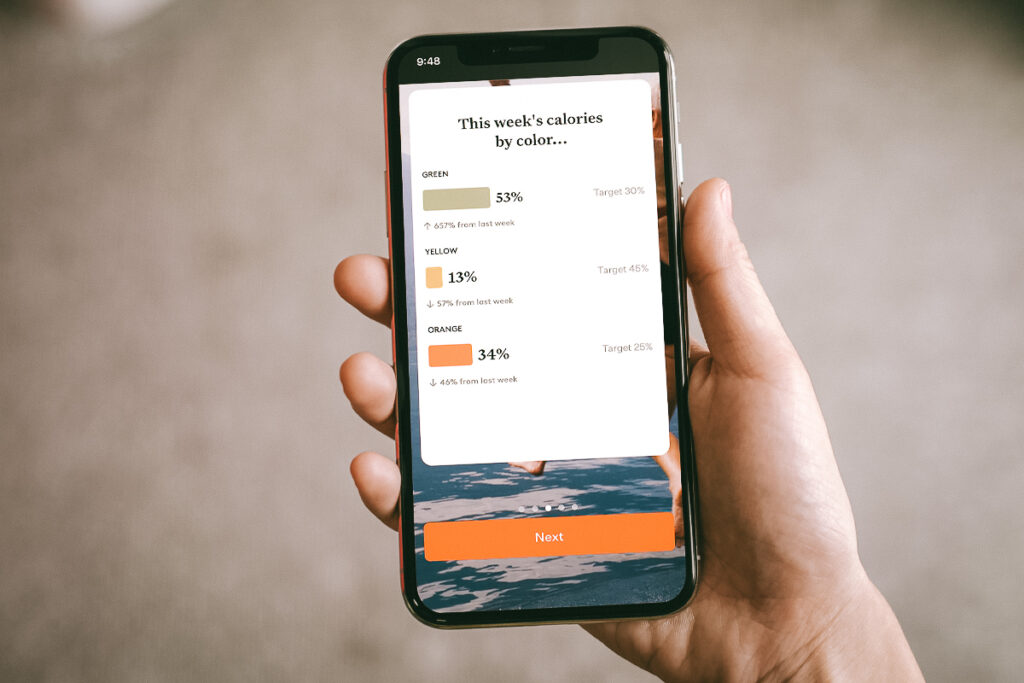
“Furthermore, these [coding] practices don’t teach people how to be flexible with food choices, tune in to their own body’s wisdom, or how individual nuances (such as family history, chronic disease, exercise, metabolism, medication, etc.) may alter a person’s nutrition needs,” says Sarah Schlichter, a registered dietitian at Bucket List Tummy.
Our testers found that a game in some lessons called “Noom’s Grocery Grab” resulted in feelings of guilt about their food choices. In the game, you’re supposed to correctly sort the foods they provide into the correct color category. These lessons made our testers feel shame instead of empowerment.
Difficult to return to a previous lesson
You do have the option to return to past lessons, but you will have a hard time finding the lesson you’re looking for. You can view past lessons by scrolling through the calendar bar at the top of the home page and clicking through the days, but the calendar bar is not easy to navigate because it is only labeled with the days of the week and not the date. So you will likely have to click through each day to find the lesson you’re looking for.
Our testers found it helpful to bookmark lessons they liked so they could find them again more easily.
Daily weigh-ins are encouraged
Logging your weight daily can be a form of accountability for some, but it can be a source of anxiety for others, according to the American Heart Association. Noom encourages you to weigh yourself every day because research shows that people who weigh themselves daily lose more weight than those who only do it one to two times per week.
However, the study doesn’t consider the psychological effects of weighing yourself. It’s possible that the study participants who lost weight did so because their mental health was affected, and they ate less food or developed unhealthy eating habits. It’s difficult to know when the only collected data was the number on the scale.
An article on Noom’s blog acknowledges that you may experience negative emotions from stepping on the scale and can weigh yourself as often as you like, and the lessons recommend that you start slowly by weighing yourself once a week and work toward weighing yourself daily.
The problem becomes more significant when we let the scale number influence what we wear, how we eat, how we talk to ourselves, how we focus, and even how we interact with others.
Karin Evans, PhD, RD
Recipe feature is difficult to use
The recipe feature on Noom was disappointing. The search filters were limited and only consisted of “breakfast,” “lunch,” “dinner,” and “snack.”
There is a search bar at the top of the recipe index, but our testers didn’t have much luck searching for recipes. The results rarely matched the term they searched. It’s also difficult for people with dietary restrictions to find recipes that accommodate them. The only dietary restrictions Noom takes into consideration are gluten-free and vegan—there are no labels for other allergies or dietary needs.
From our tester
“I follow a gluten-free diet, and I found it very difficult to find gluten-free recipes. Even though some recipes are clearly marked as gluten-free, there is no easy way for people with dietary restrictions to sort through the recipes.”
Lack of comprehensive screening for eating disorders
In the sign-up questionnaire, Noom will not allow someone who identifies as having an eating disorder to join the program. Although Noom intends to prevent people with eating disorders from joining their platform, there is more they could do to screen for this in the sign-up process and beyond. According to research, dieting can lead to the development of an eating disorder.
There should be frequent check-ins from coaches and resources available to people with signs of eating disorders, but Noom does not currently have a way to screen for that mid-program. And it can be difficult for someone to recognize the symptoms of an eating disorder on their own.
“Sometimes people don’t even recognize their mental health is being impacted—that’s the sad part,” says Evans. “The strategies and belief systems these platforms promote are so widely regarded as normal that people don’t think that anything strange is going on.”
What is Noom?
Noom is a weight loss platform that combines psychology and human coaching to help you with your health and wellness goals. Every day, the Noom app provides you with “Daily Lessons” that educate you on various aspects of nutrition, wellness, and weight management. These lessons are meant to inform your dietary choices, help you find ways to incorporate movement into your daily life, and teach you about your relationship with food.
For most people, it’s unrealistic to spend more than 20 to 30 minutes on a weight loss app. We like that with Noom, you get to choose how long you want to spend on your lessons. You can choose between one to four minutes, five to eight minutes, or nine to 12 minutes. We picked five to eight minutes which was the perfect amount of time to fit into a busy schedule. If you have extra time, you can complete additional lessons to get ahead.
To track your daily progress, Noom encourages you to weigh yourself and log your meals, movement, and water intake. If you log your meals and weight and complete your daily lesson, you earn you a Noomcoin. When you earn five Noomcoins, you unlock a “Treat Day” that encourages you to take a day off from Noom.
What makes Noom different from other weight loss platforms is that it encourages users to make behavioral changes—in addition to nutritional and dietary changes—for a healthier lifestyle. For instance, in one lesson our testers learned stress management techniques since stress can often trigger unhelpful habits. The technique, called ‘IMPROVE the Moment’ is a dialectical behavior therapy (DBT) skill that can relieve emotional distress.
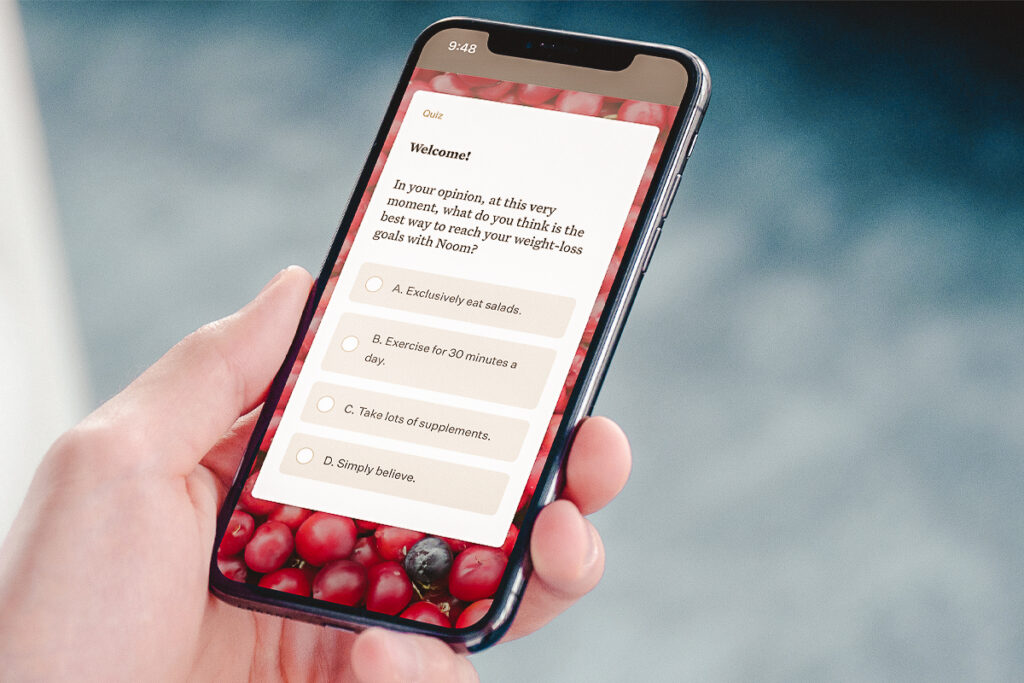
How does Noom work?
Signing up for Noom begins with an extensive 10- to 15-minute questionnaire you can complete on your computer or mobile device. The questionnaire asks you about yourself (age, sex, gender identity, height, weight, etc.), your weight loss goals, your eating and activity habits, and more. Although the questionnaire takes some time, our testers found it easy to fill in the information.
You’re also asked to enter your “ideal” weight, which is the weight you hope to achieve. When you enter your ideal weight, you must choose a number within the Centers for Disease Control and Prevention (CDC) guidelines on BMI (body mass index). You cannot enter an ideal weight that creates a BMI under 18.5, which is considered underweight.
After you complete the questionnaire, Noom will create a personalized plan that tells you the length of your course, what goals your plan will focus on, and an estimate of when you will reach your ideal weight.
During this intake process, Noom will also provide you with your trial period and course costs. You can add on “course enhancements,” which are additional lessons on topics such as mental wellness, stress reduction, and aging and metabolism that are recommended based on your questionnaire answers.
If you signed up for Noom on desktop, you’ll be instructed to download the app once you complete the sign-up process. The platform will send you a download link, or you can scan a QR code for a link. Our testers found it easy to download the Noom app from the provided instructions.
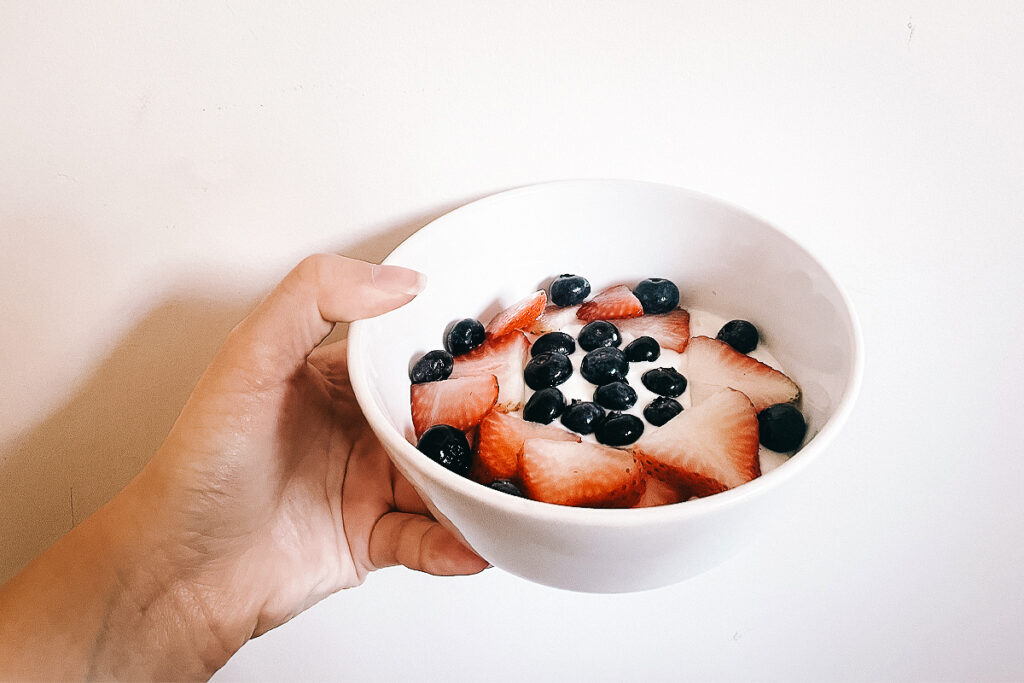
Daily lessons
You can find your daily lessons, which you can read or listen to, on Noom’s home screen. The 10 mini-courses cover topics like nutrition, activity, stress, and more, and each course is split into multiple lessons. These lessons were easily accessible, it was great to have the choice to listen to them while completing other tasks or read the information at our own pace.
On the top right of the app, there is a map that tracks how far along you are in the course. Depending on how much time you dedicate to your lessons or how many you do each day, you can complete the entire course in 16 weeks. Afterward, you can move on to part two of the Noom program, which helps you integrate healthy habits into your daily schedule.
The first mini-course is “101: Introduction to the Psychology of Weight Loss,” which can take four to five days to complete. In this section, you learn about caloric density, factors driving your food choices, and healthy eating habits.
Logging food, weight, and movement
Every day, the app encourages you to log:
- The food you eat.
- Your weight.
- Your water intake.
- Any activities you participate in (this can range from walking and running to playing with your kids and doing housework).
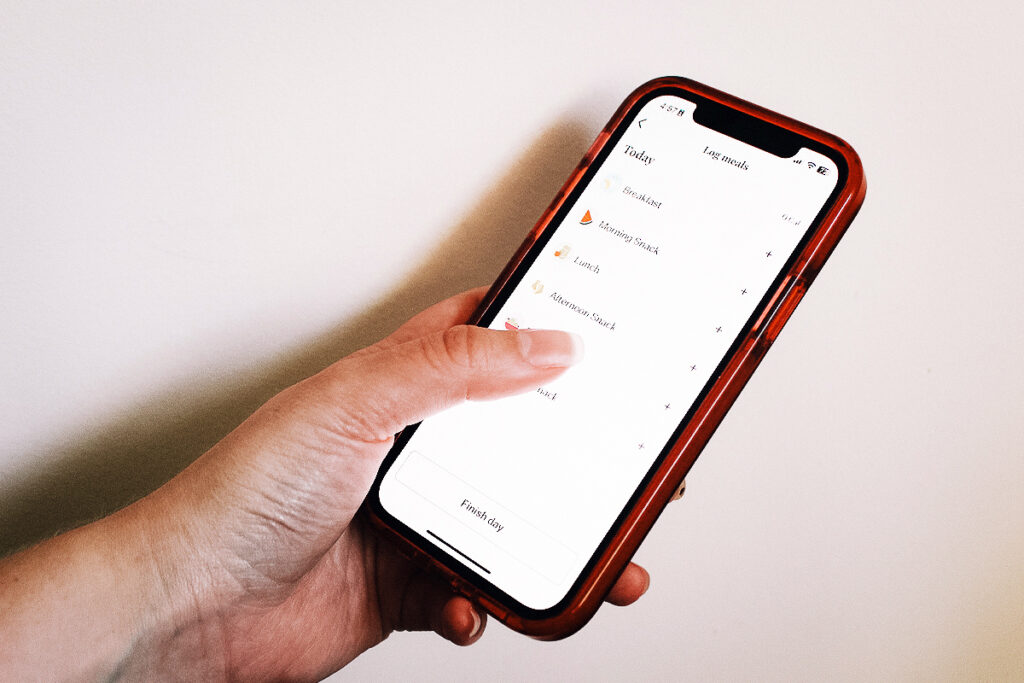
You can log these on the app by clicking an icon at the bottom of the home screen. Meal logging was particularly easy since Noom has an extensive food database with specific brands and nutrition information. All you have to do is choose the type of food and the quantity.
Noom encourages you to follow a color system when making dietary choices. The system separates foods into a color category based on their caloric density (the average calories per weight or volume) and nutritional value:
- Green foods are low in caloric density and/or contain the most nutrients per serving.
- Yellow foods have more caloric density than green foods and less than orange foods.
- Orange foods are high in caloric density.
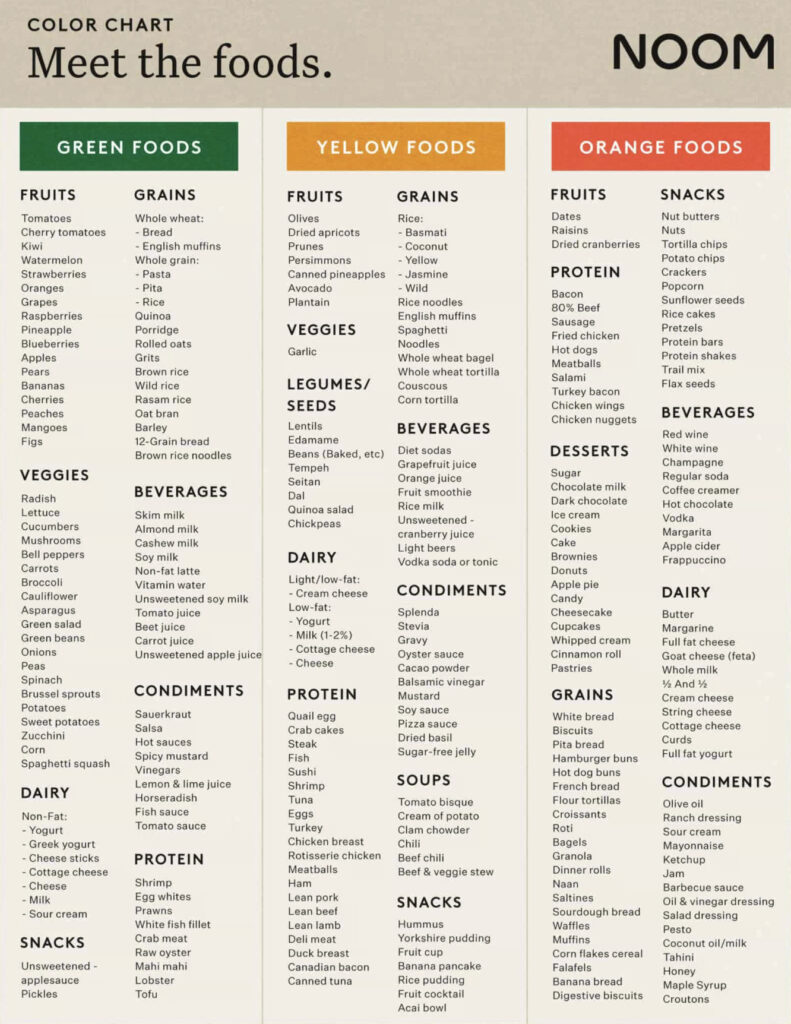
Health coaching
Coaching is one of the main features of Noom. You can contact your coach through an in-app chat if you have questions about the platform or need support on your healthy living journey.
When our tester spoke with their coach, the coach was friendly, compassionate, and understanding. They offered reassurance and suggestions for our tester’s issues. However, our tester found it difficult to hold a text conversation with their coach because their response time ranged from four hours to two days.
From our tester
“When I asked about her credentials, she pointed me to her bio page that listed her coaching experience but no credentials. I’m assuming coaches don’t have to be credentialed in any area.”
Noom health coaches are trained through a program called Noomiversity. This program is over 75 hours long and provides an education in health and wellness. The program aims to provide coaches with the needed skills to guide people of diverse backgrounds and experiences. While some coaches are counselors, dietitians, or National Board Certified Health and Wellness Coaches, Noom health coaches are not required to have any certification.
If you aren’t satisfied with your health coach, you can contact customer support to request a new match, but you may not be successful. To access customer support in the app, go to the menu bar on the top left and tap on the “Help” section. When our testers requested a new coach, customer support told them they would receive one in about five business days. However, they never received a new coach.
How much does Noom cost?
Our testers discovered that their cost and plan length depended on their questionnaire responses. One question asks if you have an important event coming up, like a wedding, reunion, or birthday. When you enter the event date, your personalized plan will correlate. For example, if you have a wedding to go to in ten months, you will get a ten-month plan. When our tester said they didn’t have a special event coming up, they received a two-month plan.
Though you can say you have an event in six months if that’s the length of time you’d like to use the platform, our testers found it annoying to have to trick the system in order to get a plan that fits their needs and budget.
On their website, Noom provides a list of all the plans and their cost:
| Auto-renewing plan | Cost |
|---|---|
| Monthly | $70 |
| Two-month | $129 |
| Three-month | $159 |
| Four-month | $169 |
| Five-month | $174 |
| Six-month | $179 |
| Seven-month | $184 |
| Eight-month | $189 |
| Nine-month | $195 |
| Ten-month | $199 |
| 11-month | $205 |
| Annual | $209 |
The cost may increase if you decide to add course enhancements, which vary in price.
If you want to test Noom before you commit to a subscription, you can choose a seven or 14-day trial period. The trial period isn’t free, but they offer a pay-what-you-can model with options for $0.50, $3, $10, and $18.
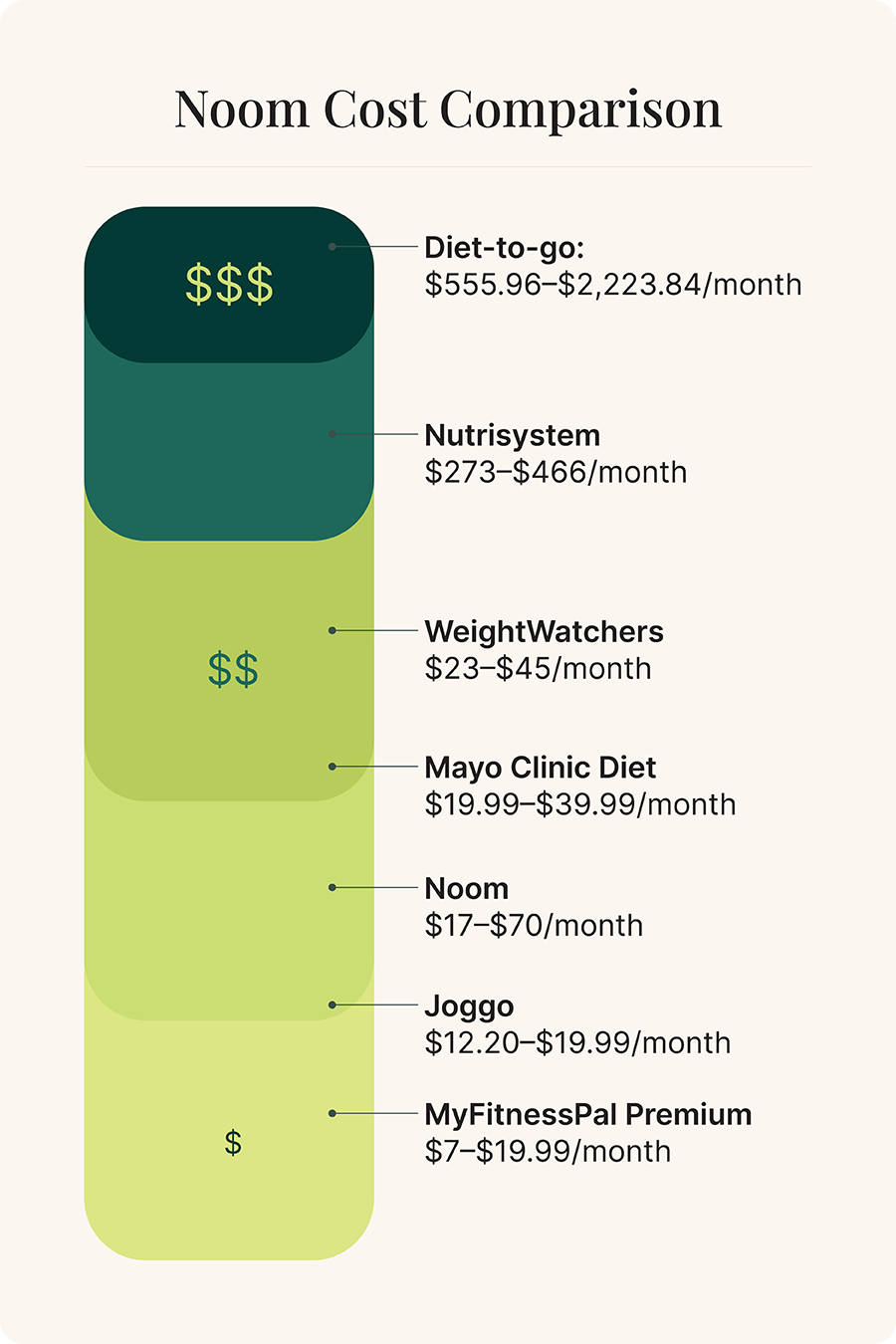
Although Noom is more expensive than Joggo and MyFitnessPal Premium, it’s more affordable than other brands we’ve reviewed, including WeightWatchers and Mayo Clinic Diet.
Key features of Noom
Several features of Noom can help you become more accountable on your journey to healthy living.
- The daily lessons focus on more than just weight loss and offer tips to help you in your overall wellness journey.
- You can select how long you want the lessons to last to fit your schedule.
- The app helps you track your weight, meals, movement, and water intake each day.
- You can add extra “course enhancements” on specific topics to your daily lessons and plan.
- You can connect with a personal health coach through the Noom app for support and guidance.
We did find the recipe feature in the app difficult to use, and it is difficult to go back to previous daily lessons if you want to revisit them.
If you are experiencing signs of an eating disorder
First, know that you are not alone. Eating disorders affect people all over the world. In fact, 9% of people worldwide have an eating disorder. The Association of Anorexia Nervosa and Associated Disorders (ANAD) has the following resources available to people who are experiencing signs and symptoms of an eating disorder:
- Call the Eating Disorders Helpline at 888-375-7767, available Monday through Friday from 9 a.m. to 9 p.m. (unavailable on most major holidays).
- Join a virtual peer support group—there are general support groups and focused groups for LGBTQ+, BIPOC, caregivers, older adults, teens and young adults, siblings, people with larger bodies, men, and binge eating disorder.
- Request a mentor for free using the Recovery Mentorship Program.
- Browse the treatment directory to find a provider that specializes in eating disorders.
These resources can be helpful, but ultimately, you should talk to a health care provider about the symptoms you are experiencing. “I’d suggest contacting a registered dietitian or therapist/counselor with experience in treating disordered eating and eating disorders. This is important because not many registered dietitians and therapists may know how to recognize the red flags and address the issues,” says Karin Evans, registered dietitian nutritionist at Top Nutrition Coaching.
Our final verdict
We really like that Noom educates you on nutrition, holds you accountable to your goals, and provides a compassionate and encouraging environment. It’s one of the only platforms we tested that provided us with tools to continue our weight loss experience without the app itself.
We couldn’t get on board with the color coding system for food—there has to be a better way to help users quickly identify foods they should try without making other options seem “bad.”
No platform is a complete replacement for one-on-one counseling with a professional, like a dietitian or a therapist. Noom can hold you accountable and provide a basic nutrition education, but a professional can fully support you through your journey.
We recommend talking to your doctor before starting a new diet or fitness routine. And remember that weight loss isn’t the most important goal. Healthy living should be about nurturing positive relationships with food and your body.
Frequently asked questions
Noom is an established weight loss platform. Users have reported that they have lost weight using this platform.
You can choose between a seven- and 14-day trial to see if Noom is right for you. The cost for the trial is pay-what-you-can, so you can choose to pay $0.50, $3, $10, or $18.
There are no drinking restrictions while using Noom. You can log alcoholic beverages on the app when you log your meals.
Noomcoins are rewards for taking action in your journey to healthy living. You can earn one Noomcoin every day by logging all of your meals, completing your assigned lesson, and logging your weight. For every five Noomcoins you earn, you get a Treat Day, where you can take a day off from Noom activities.
The average monthly cost of Noom varies depending on the plan length. While the monthly auto-renewing plan costs $70, a two-month plan costs $129. According to Noom, most people start with a four-month subscription, billed upfront as a four-month auto-renewing plan for $169. That comes out to $42.25 per month.
- Ingels, J. S., Zizzi, S. (2018). A qualitative analysis of the role of emotions in different patterns of long-term weight loss. Psychology & Health, 33(8),1014-1027. Link
- How to boost mental health through better nutrition. (2023, April). American Society for Nutrition. Link
- Eat healthy. (2022, July). MyHealthfinder. Link
- Benefits of healthy eating. (2021, May). Centers for Disease Control and Prevention. Link
- Benefits of physical activity. (2023, August). Centers for Disease Control and Prevention. Link
- Skerven, K., Whicker, D., LeMaire, K. (2019). Applying dialectical behaviour therapy to structural and internalized stigma with LGBTQ+ clients. The Cognitive Behaviour Therapist. 12(9). Link
- About adult BMI. (2022, June). Centers for Disease Control and Prevention. Link
- Losing weight. (2023, June). Centers for Disease Control and Prevention. Link
- The pros and cons of weighing yourself every day. (2019, January). American Heart Association. Link
- Zheng, Y., Tison, G.H., Sereika, S.M., Burke, L.E., Olgin, J., Marcus, G.M, Aschbacher, K. & Pletcher, M.J. (2018). Abstract 10962: Temporal patterns of self-weighing behavior and weight loss in the health eHeart study. Circulation, 138(1). Link
- What is disordered eating? (2018, October). Academy of Nutrition and Dietetics. Link
- Giachin, G. (2023). Eating Disorder Statistics. National Association of Anorexia Nervosa and Associated Disorders. Link
- Eating disorders helpline. National Association of Anorexia Nervosa and Associated Disorders. Link






